Key takeaways:
- Effective communication is crucial for teamwork; sharing ideas and listening fosters collaboration and prevents misunderstandings.
- Embracing continuous learning transforms challenges into growth opportunities, empowering individuals to navigate the rapidly changing tech landscape.
- Building a robust portfolio is essential; it not only showcases finished projects but also documents the learning journey and emphasizes collaboration and resilience.
- Networking with colleagues fosters genuine connections that enhance both professional growth and workplace enjoyment.
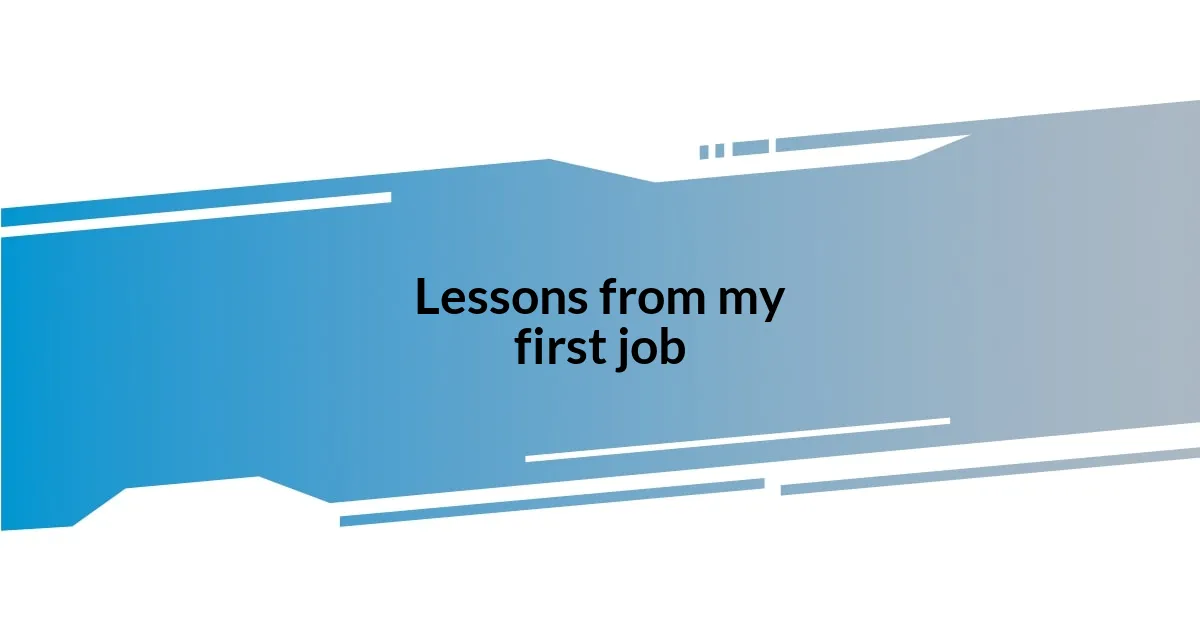
Lessons from my first job
One of the biggest lessons I learned from my first programming job was the power of communication. Early on, I would spend hours perfecting my code only to realize that I hadn’t clearly articulated my ideas to my team. This taught me that being technically proficient isn’t enough; sharing your vision and listening to feedback is just as crucial. Have you ever found yourself stuck in a project because you didn’t speak up? I certainly have.
I also discovered the value of failure. There was a project I worked on that, despite my best efforts, wasn’t successful. I felt defeated at the time, but looking back, it was a pivotal moment that taught me resilience. Instead of shying away from challenges, I learned to embrace them – every misstep was a learning opportunity. Can you relate to the fear of failure in your own experiences?
Finally, I learned how essential it is to keep learning. The tech landscape changes rapidly, and during my first job, I started to realize that my education didn’t end with a degree. I committed to picking up new tools and technologies during my evenings, and that practice made all the difference in my professional growth. Did you ever feel like you needed to catch up? I certainly did, and it was both intimidating and invigorating.
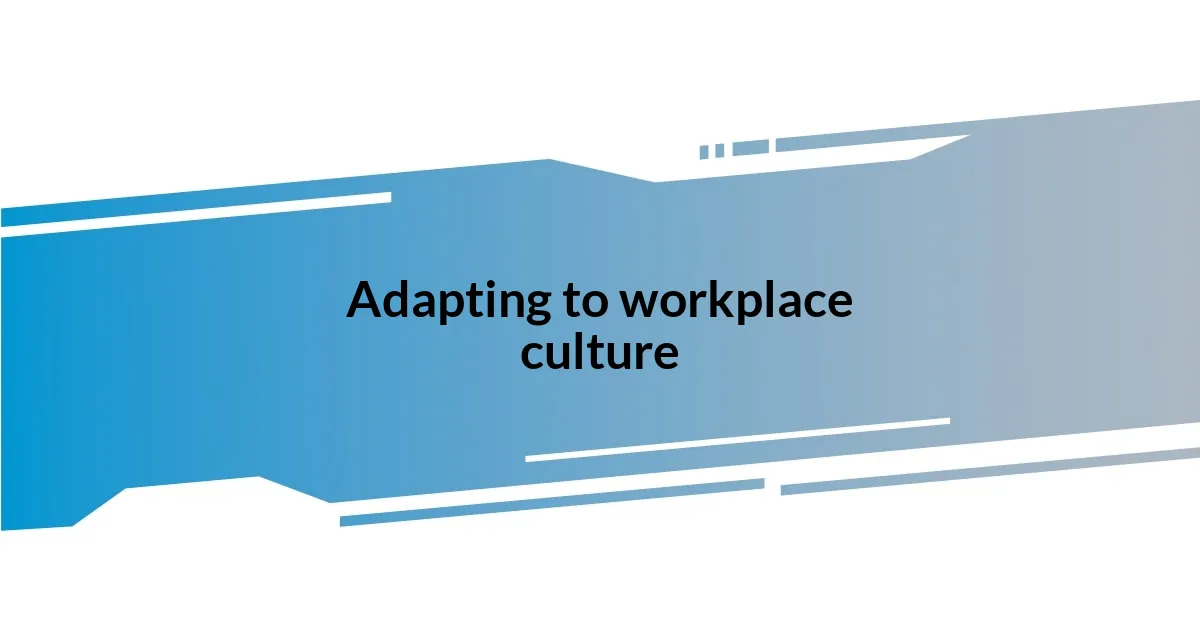
Adapting to workplace culture
Adapting to workplace culture can be one of the most challenging yet rewarding experiences. In my first programming job, I found myself in a company where collaboration was highly valued. Initially, I struggled to fit in. As an introvert, I preferred working alone, diving into my code. However, I soon realized that engaging with my colleagues not only fostered camaraderie but also enhanced my work. I remember a brainstorming session that transformed a project idea completely—by simply being open to others’ insights, I felt part of something bigger.
Navigating the unspoken rules of the workplace often took time. One day, I unintentionally spoke over a senior developer during a meeting, which led me to understand the importance of respecting hierarchy. It was a small but impactful lesson that stuck with me. I learned to actively listen and create space for others to voice their thoughts. Have you ever felt out of place? That feeling can lead to growth, as it encourages you to adapt rather than resist.
Another aspect of workplace culture I encountered was the emphasis on balancing work and life. At first, I thought putting in long hours would impress my boss. However, I quickly realized that my coworkers valued efficiency and well-being over sheer volume of work. Embracing this philosophy improved my productivity and overall happiness. It’s amazing how understanding a company’s culture can shift your perspective. Have you ever found yourself rethinking your approach based on those around you?
| Company Value | Personal Experience |
|---|---|
| Collaboration | Transformed project ideas during team discussions |
| Respect for Hierarchy | Learned to listen more and speak less |
| Work-Life Balance | Shifted focus from hours worked to efficient productivity |
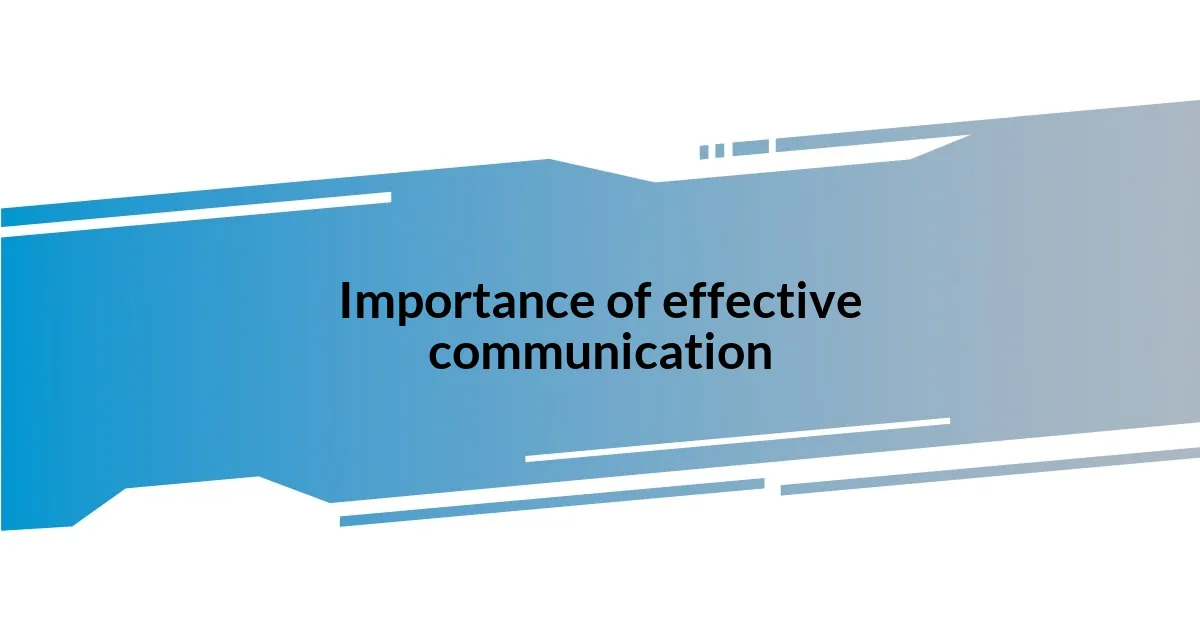
Importance of effective communication
Effective communication in the workplace turned out to be a game-changer for me. I remember one instance during a team project where I failed to clarify my thoughts about the user interface design. Frustration bubbled up when, after the project launch, I realized the team had taken a different approach than I envisioned. It struck me that sharing my ideas, no matter how developed or raw, was essential. I embraced the fact that open dialogues could prevent misunderstandings and foster collaboration. Without effective communication, I would have likely spent more hours debugging not just code, but also our collective misaligned visions.
- Clear articulation of ideas promotes teamwork.
- Listening to feedback creates stronger project outcomes.
- Open channels of communication foster a supportive work environment.
- Clarity in messaging reduces anxiety and confusion.
During one memorable feedback session, I discovered the power of active listening. My manager pointed out that my approach to presenting my work often overlooked team input. That realization was humbling. I started to see communication as a two-way street; where sharing ideas was just as important as inviting others to build upon them. I felt a shift in my confidence, realizing that every voice contributed to our collective success. Understanding this dynamic transformed my relationships with colleagues and enriched my projects. It was a simple yet profound shift that I never took for granted again.
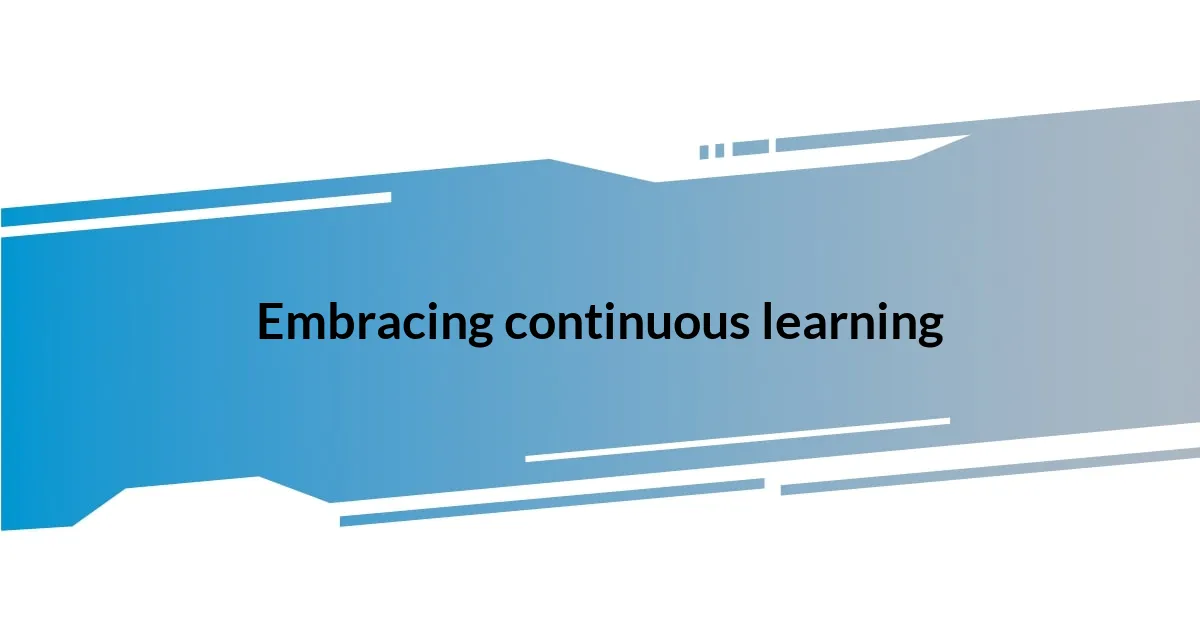
Embracing continuous learning
Embracing continuous learning was a cornerstone of my first programming job. I vividly remember stumbling upon a particularly complex bug that had the team stumped. Rather than sitting in quiet frustration, I decided to dive into the issue, exploring online resources and tutorials. That experience transformed my approach to learning; the more I sought out knowledge, the more empowered I felt. Have you ever ventured into the unknown and come out more skilled on the other side? It’s incredibly satisfying to solve a problem by expanding your expertise.
As I navigated through projects, I learned the importance of seeking feedback. During one of our sprint retrospectives, I hesitated to ask for input on my code, fearing criticism. But I found that soliciting advice not only polished my work but also deepened my engagement with my team. There’s something about inviting others to critique that breeds growth. Have you ever realized that what initially feels uncomfortable can open doors to great learning opportunities? That discomfort became a catalyst for continuous self-improvement.
Reflecting on my journey, I started to view challenges not as obstacles, but as invitations to learn. When faced with a tight deadline, instead of panicking, I’d ask if there were new techniques or tools I could explore to streamline my work. That shift in mindset felt liberating. I began to see every project as a lesson, every conflict as a stepping stone. How might your work change if you approached challenges as exciting chances to grow? Embracing continuous learning reshaped my professional identity, and I couldn’t be more grateful for the evolution it inspired.
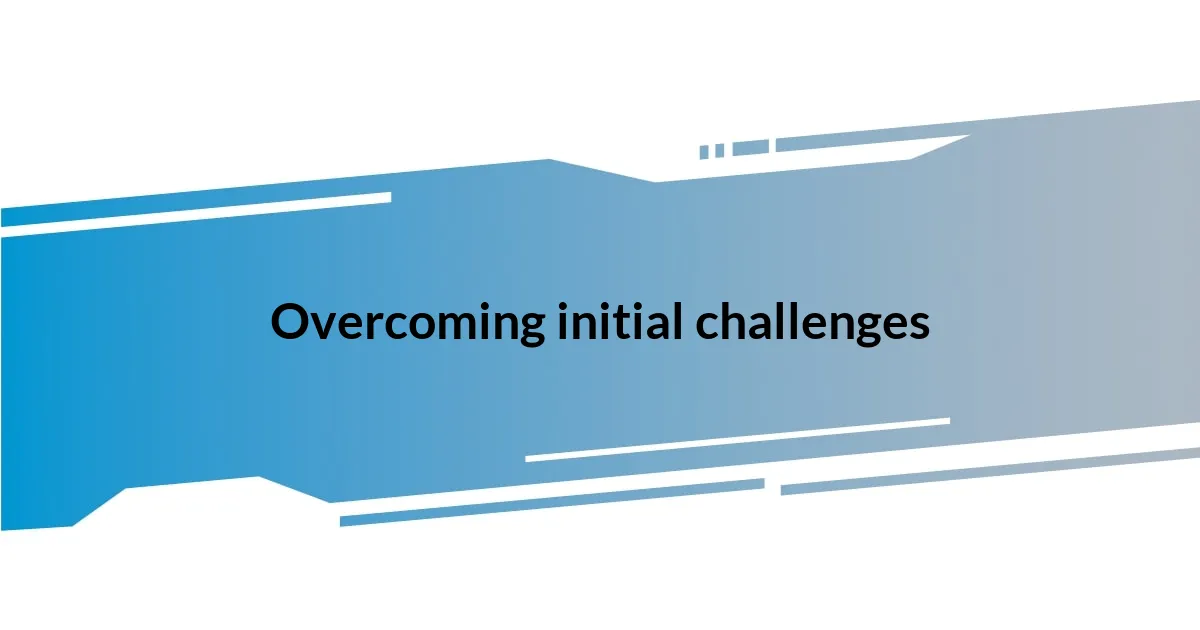
Overcoming initial challenges
During my first few weeks, I felt overwhelmed by the sheer volume of tasks and expectations. I remember standing before my first assignment, a coding challenge that seemed insurmountable. In that moment, I learned to break the problem down into manageable parts. This method not only simplified my approach but also built my confidence. It’s funny how tackling a big problem piece by piece can change your perspective—have you ever tried it yourself?
The team dynamic added another layer of challenge. I found myself hesitant to share my ideas, fearing they wouldn’t be well-received. But during one particularly challenging meeting, I took a leap of faith. I voiced my thoughts on streamlining our project’s workflow, and to my surprise, my teammates welcomed the suggestion with enthusiasm. That experience taught me the value of vulnerability. Isn’t it remarkable how sharing what feels trivial to one can spark innovative ideas in others?
Then there were moments when I faced significant setbacks, like the time I misconfigured a server that caused delays. My heart sank, and I worried about how my mistakes would reflect on my ability. But instead of succumbing to panic, I approached my manager for guidance. It was a relief to discover that everyone makes mistakes and that owning up to them can actually strengthen trust. Have you ever felt that weight lift when you sought support? I realized that asking for help wasn’t a sign of weakness but a stepping stone to resilience.
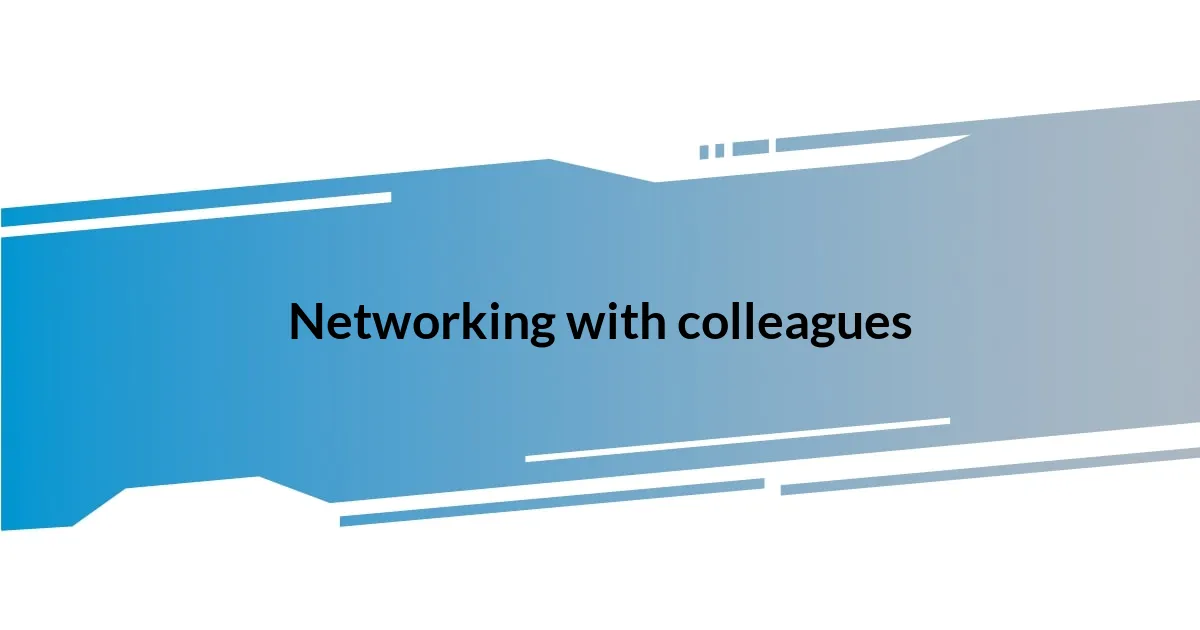
Networking with colleagues
Networking with colleagues was an unexpected but vital aspect of my first programming job. I still remember the day I joined a casual team lunch. I felt a bit out of place initially, but as conversations unfolded, I discovered shared interests and projects that ignited my enthusiasm. Have you ever found common ground with someone you barely knew? Those lunch chats not only made me feel more integrated into the team but also opened doors to collaborative opportunities that I couldn’t have planned for.
One of my memorable experiences involved reaching out to a colleague who was known for expertise in a specific tech stack I was struggling to grasp. Instead of hesitating, I sent a quick message asking for a brief chat. To my surprise, they were more than willing to help, sharing insights and even pointing me to resources that I hadn’t encountered before. It was a simple interaction that transformed my understanding of the technology. Isn’t it incredible how a small step can lead to immense growth?
I quickly realized networking wasn’t just about professional gains—it fostered genuine connections. I remember attending a tech workshop where I met a fellow developer who later became a trusted friend. We would often bounce ideas off each other, reviewing code and tackling problems as a duo. Those relationships made long workdays much more enjoyable. Have you ever felt that sense of camaraderie with a coworker that turned ordinary tasks into enjoyable challenges? It’s this blend of friendship and collaboration that ultimately enriched my early career experience.
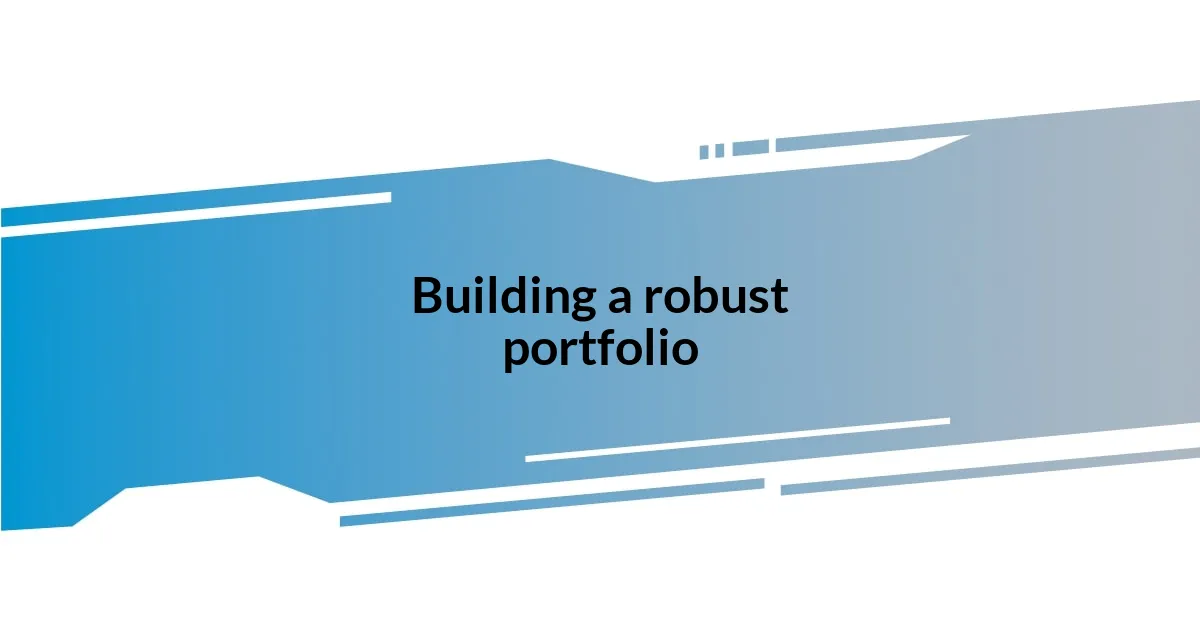
Building a robust portfolio
Building a robust portfolio was something I quickly learned was essential for my career development. Early on, I hesitated to showcase my work, thinking it wasn’t impressive enough. But one afternoon, after creating a small project that I had poured my heart into, I decided to share it on GitHub. The feedback I received was overwhelmingly positive and really shifted my perspective—have you ever held back from sharing your work, only to find out that others genuinely value it?
As I continued to grow, I understood that a solid portfolio isn’t just about displaying finished projects. It’s about documenting my learning journey, showcasing the challenges I faced and how I overcame them. I vividly recall a coding error that took me hours to fix. Instead of glossing over it, I included that experience in my portfolio, explaining the solution and the lessons learned. This transparency not only made my work relatable but also built a narrative of resilience. Have you ever thought about the stories behind your projects?
Finally, I found that collaborating on diverse projects enriched my portfolio immensely. Working with others allowed me to blend my skills with theirs, creating results that I couldn’t have achieved solo. I still cherish a particular project where a teammate and I tackled an ambitious feature together. We pushed each other’s boundaries, and that final product became one of my proudest achievements. It made me wonder—how often do you collaborate with others to craft something bigger than yourself? A strong portfolio is a reflection of those shared experiences, showcasing not just what I’ve done, but how I’ve evolved through collaboration.